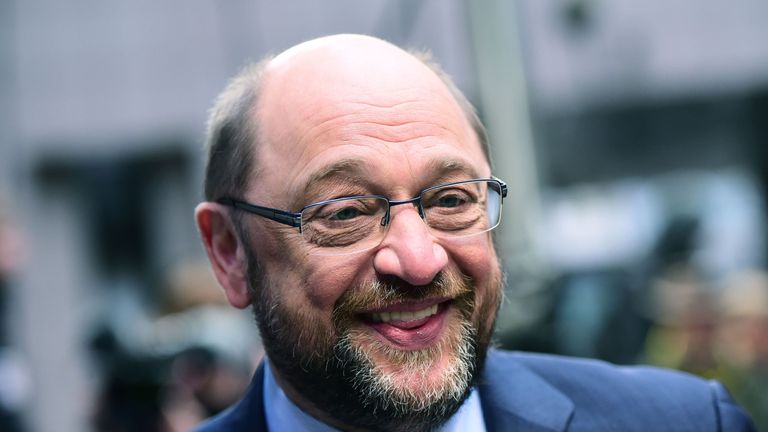Germany's SPD to vote on coalition talks with Merkel's conservatives
Germany's Social Democrats will vote on whether to enter into grand coalition talks - or plunge the nation into political crisis.
Sunday 21 January 2018 03:49, UK
The fate of German Chancellor Angela Merkel and the direction of European politics will become clearer after a vote by 600 members of Mrs Merkel's opposing party, the Social Democrats (SPD).
At a meeting in the former West German capital Bonn this afternoon, delegates from the SPD will vote on whether or not they think their centre-left party should enter into formal talks to form another Grand Coalition with Mrs Merkel's centre-right Christian Democrats (CDU) and its partner the Christian Social Union (CSU).
The grassroots delegates hold the key to the chancellory for Mrs Merkel. They will determine the political direction for Europe's strongest economy and the EU's most powerful member. Their choice will impact EU integration, Germany's global clout and the Brexit negotiations.
Calling for a 'yes' vote to coalition talks, Mrs Merkel said at a news conference alongside the French President Emmanuel Macron on Friday: "To act in Europe it is vital that Germany has a stable government.
"Germany and France can and should take the lead on many European questions and therefore I understand France's impatience for us to form a new government."
The leader of the SPD, Martin Schulz, also urged a 'yes' vote.
"If the party rejects a coalition it will lead to new elections, and fast," Mr Schulz said in an interview with Der Spiegel magazine.
"If the parties who represent a majority in the Bundestag (the German parliament) fail to form a government, they will be punished by voters."
Here are some of the key issues explained:
:: For or against a 'GroKo'?
If the SPD delegates vote for formal talks, then a new German government, in the form of another grand coalition (Grosse Koalition or GroKo as it's known), would probably follow, with Mrs Merkel returned as Chancellor.
If they vote against formal talks, then the prospect of a grand coalition is thrown out and Mrs Merkel must either form a minority government which would put her in a dramatically weaker position domestically and internationally, or she must call fresh elections. It could prompt her to quit altogether.
Both options have significant consequences for German and European politics.
Last week, senior figures from the CDU, the CSU and the SPD produced a "coalition blueprint" which they believed formed the basis of formal coalition talks.
However, at SPD grassroots level, the paper was not received well. SPD critics said the paper lacked substance and omitted key themes and policies central to the SPD's socialist core.
There was no substantive mention of the SPD's call for Eurozone reforms, for higher taxes for the rich, or a consolidated public healthcare insurance system.
:: How did we get here?
In the federal election last September, Mrs Merkel's CDU party suffered a massive dent in its popularity. But the SPD vote was truly disastrous.
The centre-left party, which has formed a grand coalition with Mrs Merkel's party for eight of the past 12 years, achieved a record low score of 20.5% in the ballot.
After the election, its leader, Martin Schulz, blamed the disaster on his party's coalition with Mrs Merkel.
He vowed never to form another coalition and said the SPD's best chance for future success was to rebuild its base in opposition.
But when Mrs Merkel failed in her only coalition option, with the Free Democrats Party and the Green Party, Mr Schulz was persuaded back to the coalition negotiating table.
:: What are the differing opinions and the options?
SPD MPs are largely behind another grand coalition. It would, for one, probably give them control of the powerful German Finance Ministry from where they could push their federalist EU and Eurozone agenda.
But the grassroots membership, especially the youth wing of the party, is less keen on a GroKo because they are fed up with compromises and broken promises.
As they prepare to vote, the SPD delegates will be aware that neither option presents a particularly positive future.
If they form another coalition with Mrs Merkel, they will be opting for "more of the same" - precisely what voters overwhelmingly rejected last September when they voted in record numbers for smaller fringe parties. SPD popularity will slump further.
A 'yes' for a GroKo may create a sense of stability beyond German borders with the prospect of a solid government led by Mrs Merkel. But domestically it's likely to damage German democracy with voters presented again with precisely the scenario they rejected.
:: What's the impact on the far-right in Germany?
A 'yes' to a GroKo would probably boost support for the far-right Alternative for Germany (AfD) Party.
The AfD enjoyed record successes last September. Another GroKo, placing the SPD in government, would make the AfD the official opposition party.
As the official opposition they would be entitled to extra funding and the ability to chair influential committees.
:: So what are Mrs Merkel's options if they vote 'no'?
A 'no' to a GroKo would present Mrs Merkel with two options. She could call fresh elections which would mean many more months of uncertainty and probably a similar result as the September vote.
The other option is a minority government which is untested for the EU's largest economy and most powerful nation. A minority government would render Mrs Merkel relatively powerless on the EU stage.







